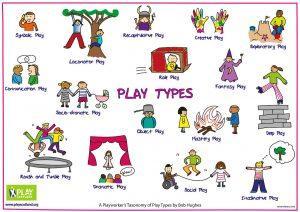Play Types
There are acknowledged to be a number of different play types (around 160) which provide playworkers, managers and trainers with a common language for describing play. There are in no particular order.

Symbolic Play – play which allows control, gradual exploration and increased understanding without the risk of being out of depth eg using a piece of wood to symbolise a person or an object or a piece of string to symbolise a wedding ring.
Rough and Tumble Play – close encounter play which is less to do with fighting and more to do with touching, tickling, gauging relative strength. Discovering physical flexibility and the exhilaration of display. This type of play allows children to participate in physical contact that doesn’t involve or result in someone being hurt. This type of play can use up lots of energy.
Socio-dramatic Play – the enactment of real and potential experiences of an intense personal, social, domestic or interpersonal nature eg playing at house, going to the shops, being mothers and fathers, organising a meal or even having a row.
Social Play – play during which the rules and criteria for social engagement and interaction can be revealed, explored and amended eg any social or interactive situation which contains an expectation on all parties that they will abide by the rules or protocols ie games, conversations, making something together.
Creative Play – play which allows a new response, the transformation of information, awareness of new connections, with an element of surprise. Allows children to design, explore, try out new ideas and use their imagination. They can use lots of different tools, props, equipment. It can have a beginning and an end, texture and smell eg enjoying creation with a range of materials and tools for its own sake. Self expression through any medium, making things, changing things.
Communication Play – play using words, nuances or gestures e.g. mime / charades, jokes, play acting, mickey taking, singing, whispering, pointing, debate, street slang, poetry, text messages, talking on mobiles / emails/ internet, skipping games, group and ball games.
Dramatic Play – play which dramatises events in which the child is not a direct participator eg presentation of a TV show, an event on the street, a religious or festive event, even a funeral.
Locomotor Play – movement in any or every direction for its own sake eg chase, tag, hide and seek, tree climbing.
Deep Play – play which allows the child to encounter risky or even potentially life threatening experiences, to develop survival skills and conquer fear eg light fires with matches, make weapons, conquer fear such as heights, snakes, and creepy crawlies. Some find strength they never knew they had to climb obstacles, lift large objects etc eg leaping onto an aerial runway, riding a bike on a parapet, balancing on a high beam, roller skating, assault course, high jump.
Exploratory Play – play to access factual information consisting of manipulative behaviours such as handling, throwing, banging or mouthing objects eg engaging with an object or area and, either by manipulation or movement, assessing its properties, possibilities and content, such as stacking bricks.
Fantasy Play –This is the make believe world of children. This type of play is where the child’s imagination gets to run wild. Play, which rearranges the world in the child’s way, a way that is unlikely to occur eg playing at being a pilot flying around the world, pretend to be various characters/people, be where ever they want to be, drive a car, become be six feet nothing tall or as tiny as they want to be the list is endless as is a child’s imagination.
Imaginative Play – play where the conventional rules, which govern the physical world, do not apply eg imagining you are or pretending to be a tree or ship, or patting a dog which isn’t there.
Mastery Play – control of the physical and affective ingredients of the environments eg digging holes, changing the course of streams, constructing shelters, building fires.
Object Play – play which uses infinite and interesting sequences of hand-eye manipulations and movements eg examination and novel use of any object eg cloth, paintbrush, cup.
Role Play – play exploring ways of being, although not normally of an intense personal, social, domestic or interpersonal nature eg brushing with a broom, dialling with a telephone, driving a car.
Recapitulative Play – play that allows the child to explore ancestry, history, rituals, stories, rhymes, fire and darkness. Enables children to access play of earlier human evolutionary stages.
